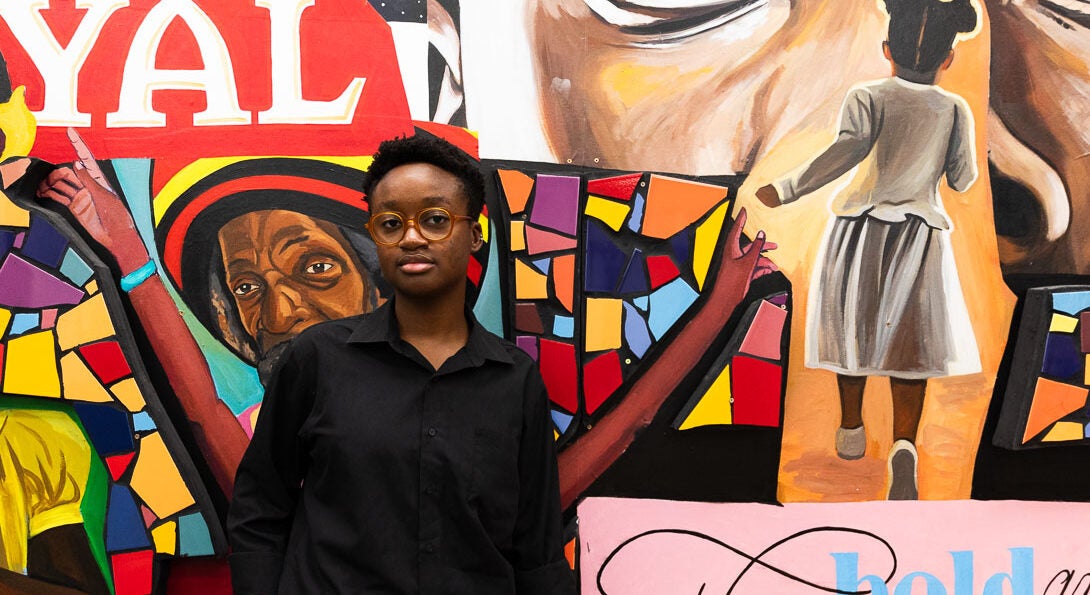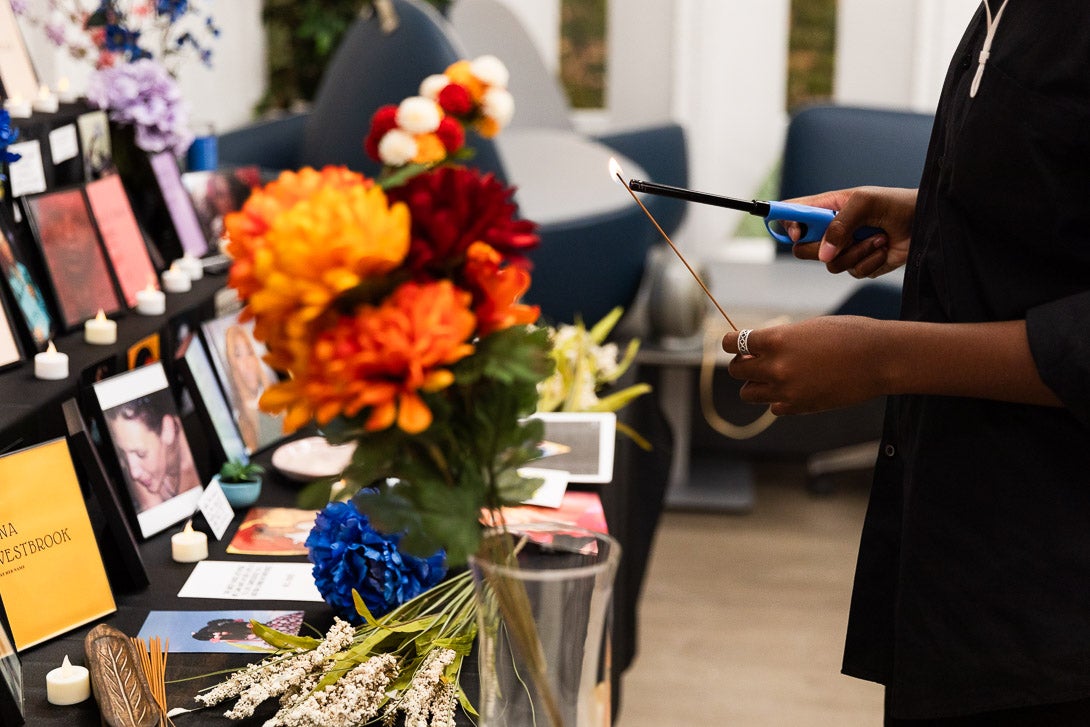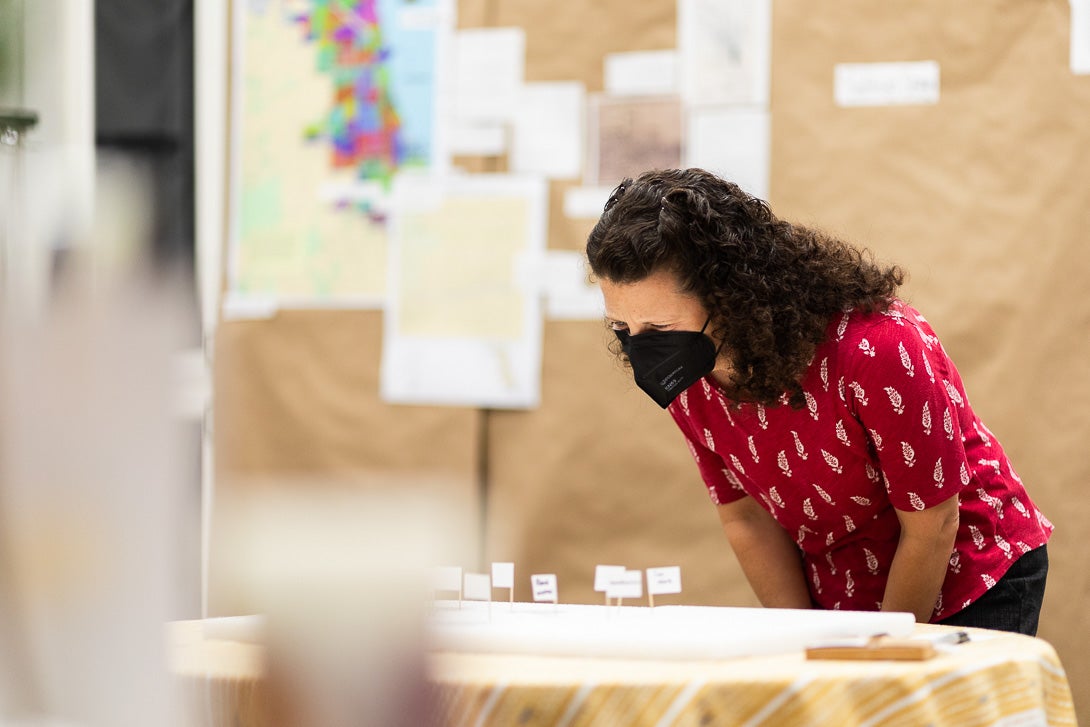LAS double major on finding spaces in UIC where students are encouraged to grow their interests and be supported

Interview with Venus
Name: Venus Obazuaye (they/them/theirs)
Major: Chemistry & Black Studies
Year in School: Sophomore
Why did you choose UIC and the College of Liberal Arts and Sciences?
I chose UIC because it offered the most opportunities to me. I love being in the city, and especially as someone interested in community health sciences, UIC and its surrounding schools do tremendous work in contributing to the overall health of Chicago.
How did you choose your major?
I was very undecided during high school about what I was going to study until I took various chemistry classes and electives during both my junior/senior year. It was one of the first things that was elusive and rewarding, kind of like a puzzle to figure out. I figured undergrad would probably be the only time I could delve into chemistry as a broad topic, so I chose that! Black Studies found me when I started meeting with professors and took Black Studies 100 as a trial course. It was supposed to be my minor, but everything we talked about, in terms of Black Studies and the university, felt right. It felt like I could verbalize some of the concepts I’d been thinking about for a while, and I declared the major soon afterward.
What has been your favorite class or professor so far?
One of my favorite classes has been HON122 with Dr. Abboud on sexual health, especially across cultures. It can be uncomfortable talking about sexual health, but Dr. Abboud made it a comfortable, safe, and queer friendly environment where we got to critique past experiences and explore what comprehensive sexual health would look like. Additionally, I loved Black Studies 100 with Dr. T, which started this project. It was the class that made me decide to pursue Black Studies as a second major, and gave me a lot to consider for my future research positionality.
Interview with Venus

What is a project you are currently working on? Or is there an internship you have participated in during your time at UIC?
I think I’d say I’m still working on Grief, Action, and Joy under Black Studies. A lot of what we were thinking about and talking about were next steps for the project like connecting with families and translating the research into actionable policy. As we keep the altar in our hearts and hands, there’s a lot to consider in terms of its continuation, like the invitation to represent at the WLRC we received!!!
What resources have you connected with and found useful on campus? MSLC, advisors, etc.
I saw the MSLC in the suggested options, and I love the space! It’s been home to a lot of final studying and connection with other students trying to understand a homework assignment or getting ready for an exam. Although it’s not necessarily a set resource, I think UIC professors as a whole have been a resource I’ve connected with. My professors pointed me towards room for social justice work in my Chemistry major, encouraged me to pursue random topics of interest, and ensured my personhood remained intact throughout college.
Are you a part of any clubs or groups on campus, and how has that impacted your experience as a student?
I’m involved with Spectrum, an affinity dwelling under Campus Housing, and Radical Public Health. I think both spaces have kind of served as refuges to go back to, with people who thought about and wished for a world similar to mine. They both served as my initial communities on campus.
What role has research played in your studies?
I think research hasn’t just played a role in my studies, but it instead challenged it. Most of the research I’ve been involved with has been social sciences/humanities-based, and it’s challenged the way my morals and priorities show up within the classroom, especially in my physical sciences classes. I think it’s made me in tune with the work I’m doing and conscious about how the readings and information I take up inform my practice as a student researcher. This project, especially, has shown me how much we owe it to our communities to do right by them as researchers, so everything I learn on the journey will be put to use for their benefit one day.
Interview with Venus

Can you talk about your research project collaboration with Theresa Ezeani titled “Grief, Action, Joy- Black Women at the Center of the Universe”?
I don’t even know where to start! It was incredible and exhilarating. I enjoyed working with Theresa a lot, and I am grateful for her trusting my random sketches and us being able to edit them and bring them to life together. It’s the product of a lot of Zoom calls, a flight from Houston to Chicago, and continuing to pinch ourselves that we were able to do this work. It was incredible, and I am tremendously grateful to have been a part of continuing these ladies’ legacies by imparting them on to others.
Your research project culminated in an art installation at the Black Cultural Center. What did it mean to you to see your work presented in this way?
Oh, it was rather insane! It was very ambitious, it started as a vague idea of wanting to pursue art, to sketches, to trying to explain the vision to Dr. T over Zoom, to me and Theresa putting it together in the days before our presentation. I think it felt right I would say. I spent the whole project trying to look for something that would do right by these women and their lives, and this was the only thing that felt sure and true in the midst of everything I was reading about. To see people experience the same emotions I did, to get angry and fired up about the lives of Black women made me feel like my work had so much transmissible impact.
This research was under the mentorship of Associate Professor Dr. Terrion Williamson whose research is in similar vein of violence against black women and girls. How did it feel to be mentored by Dr. Williamson who has extensive knowledge in this field?
It felt really honoring. When I first got the email from Dr. T offering this position and to do this work from her, I was a bit stunned. Most of my research has been deeply guided, where I was assisting an existing program, but in this case, it felt very hands-off, in a good way. It meant a lot for Dr. T to trust us so much to do this work self-guided, especially since she had so much experience, and she helped me to build confidence in my ability to struggle with my work but also continue to pursue it, knowing its meaning to myself and others.
Did you learn anything in this research that surprised you?
It didn’t surprise me in a newness sense because I’ve already known and grieved this about the U.S. time and time again. But it surprised me yet again that no matter how far you think the U.S. will hurt and destroy minority communities. I was reading a lot about gentrification, how Black communities were relegated to a Black Corridor sort of near State Street, and how the U.S. allowed racist companies, projects like the construction of I-290, and more to erode Black communities. That erosion partially contributed to the lack of a robust community that tends to expose violence. The city had so many opportunities to revitalize Garfield Park and simply didn’t. It hurts to think about the words of the residents I listened to on what “could’ve been.”
What are your aspirations after graduation? What are you looking to do after graduation?
At some point hopefully going to graduate/medical school! I’m hoping to live a full life with everything I’m passionate about—healthcare, research, community work, urban gardening, traveling, and more. I’d love to do long-term research on traditional medicine and its space in the Western healthcare model, so that is something I’ve set my sights on completing at some point after graduation.
If you could give your freshman year self one piece of advice, what would it be?
I think mostly that I’m on my own journey and path! It was hard being somewhere new and having what I thought were my life priorities grow and shift with time. It felt like the ground was shifting under my feet as I cycled through growth periods. It was, and is, important for me to remind myself everything will work out in one way or another.